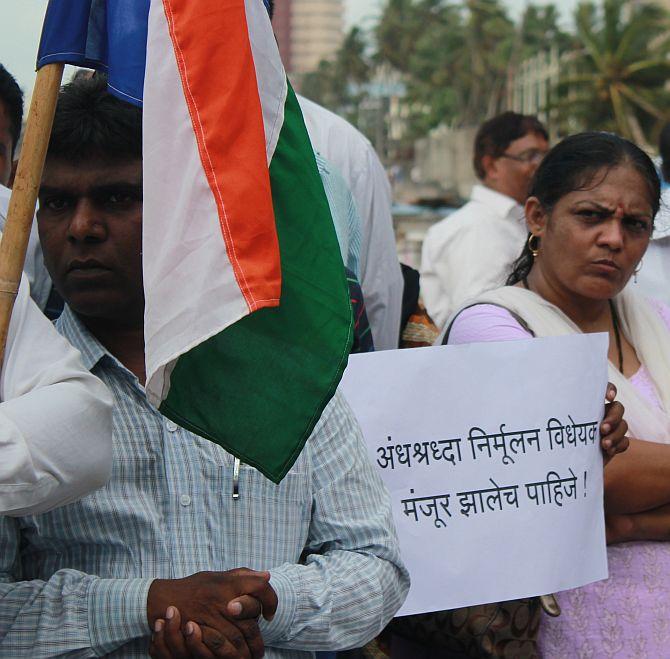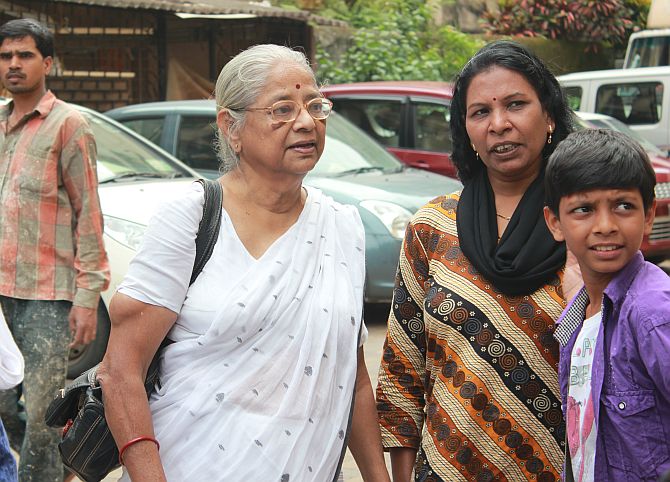
A meeting protesting the mysterious murder of Dr Narendra Dabholkar was held in Mumbai. Abhishek Mande Bhot reports.
Followers of Dr Narendra Dabholkar gathered at Shivaji Mandir in Dadar on Tuesday to protest the murder of Maharashtra’s leading rationalist. The auditorium, besides staging Marathi plays has been a chosen place for holding protests by Marathi literary, theatre, social activists.
Dr Dabholkar who was best known for his work against superstition and black magic rituals was on his morning walk in Pune on Tuesday morning when two unknown men on a motorcycle fired four bullets, killing him on the spot.
The meeting that was anchored by Shyam Manav, a long-time associate of Dr Dabholkar’s and the head of the All-India Andhashraddha Nirmulan Samiti saw several activists, volunteers as well as well-known figures from the film industry whose lives he touched.
Manav called for swift action against the murderers and criticised state’s home minister R R Patil.
...

Actress Sonali Kulkarni who studied with Dr Dabholkar’s daughter Mukta said that much of her worldview was shaped by his thoughts. “He brought about a lot of clarity in my thoughts,” she said.
Recollecting one of her earliest associations with ‘Narendra kaka’ soon after her graduation from Pune’s FergusonCollege, Kulkarni said: “It was a camp he had organised in the interiors of Solapur where he was talking to young women about their rights,” she recollected. “It was one of her turning points in my life. While on the one hand I was sharing my thoughts, I was also receiving wisdom from Narendra kaka and Dr (Sriram) Lagoo through their dialogues.”
The dialogues between the two thinkers were among the prominent aspects of the Andhashraddha Nirmulan Samiti’s public discourses. Dr Lagoo, the iconoclast argued for ‘the retirement of God’ while Dr Dabholkar, though non-committal towards the existence of a divine power, spoke in a tone that was more acceptable to the masses, yet at the same time urging them to think rationally rather than believe blindly in rituals.
Among those who worked alongside Dr Dabholkar and was present at the meeting was Pushpa Bhave -- the social activist best known for her work amongst the Dalit community as well as a leading voice protesting the mysterious murder of Ramesh Kini, a tenant who was murdered for allegedly refusing to vacate an apartment in the central Mumbai area of Matunga.
Bhave whose association with Dr Dabholkar goes back to over four decades recollected one of Dr Dabholkar’s earliest projects in Nipani where he revolted against the devdasi system by publicly cutting off the Jat (or the thickened bunch of hair, which is cultivated and bandied proudly) of a devdasi. “I remember that lady told me the next day that she had the most peaceful sleep in years that night,” she said.
It was also, probably one of Dabholkar’s few radical actions, Bhave said. “He was a rationalist -- choosing dialogue and patient action over extreme behaviour.”
She should know. For the longest time Bhave had stood alongside Dr Dabholkar as he worked hard to bring about a bill against superstition and black magic.
The bill that was renamed ‘Anti-Jaadu Tona Bill’ however hasn’t come up for discussion in the state assembly even though it has been in the list of business of the last seven years.
...

Also among the mourning protestors was the National Award-winning filmmaker Satyajit Bhatkal who recollected his last meeting with the rationalist three months ago: “We had met to discuss one of the (prospective) episodes of (the second season of) Satyamev Jayate and were to meet for about ten minutes. The meeting lasted three hours!” he said.
“I can’t say I knew him well. He was a friend of my father (Popular Prakashan’s Ramdas Bhatkal) though I had been following his work for years and in it he touched our lives. It’s very unfortunate.”
Paresh Mokashi, director of the acclaimed movie Harishchandrachi Factory, also among the many mourners also confessed that he never knew Dr Dabholkar personally. “I think very few people present here did (know him personally). A lot of us are here because we were affected by his work,” he said.
Mokashi who was an activist with Dabholkar’s Andhashraddha Nirmulan Samiti between 1985 and 1995 also said that the years changed the way he came to perceive life.
“I am shocked that someone who wasn’t an extremist should meet such a (violent) end. But the killing of a tree doesn’t stop new shoots from sprouting,” he said.
Click on NEXT to go further...

Sunil Kadam stands away from the crowd looking away at the sea.
By now the morcha has moved to Dadar’s Chaityabhoomi where animated speeches are being made. Shyam Manav is still anchoring the meet.
Kadam is a teacher. His association with Dr Dabholkar goes back 23 years. “I first saw him in 1990 during a camp in Panvel. I was 18 at the time and I remember being drawn in by his ideas,” he recollected.
Since then, Kadam has been associated with Dr Dabholkar travelling and spreading his message. Like many of his compatriots, Kadam too remembers the public dialogues of Dr Lagoo and Dr Dabholkar.
“I don’t think our society was ready for Dr Lagoo’s (revolutionary) thoughts. Dr Dabholkar believed in reaching out to people, taking them with him. He understood the pulse of the society. Few leaders can do that.”
Kadam, much like the others, expressed shock at his leader’s violent end, though he didn’t seem overtly concerned about the future of the movement in the face of the loss of such a towering figure.
“Great people die but their thoughts live on. You can kill a person; you cannot kill an idea!” he said.
Click on NEXT to go further...
...